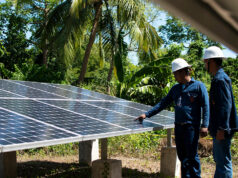By Vincent Mariel P. Galang
Reporter
“Ten Filipino Social Enterprises were introduced to potential investors, which are part of the Innovation for Social Impact Partnership (ISIP), a three-year project that aims to accelerate and sustain the capacity of social enterprises.”
IN boosting social enterprises, the project is contributing to the country’ attainment of the Sustainable Development Goals. It is co-implemented by the United Nations Development Program (UNDP), the Philippine Development Foundation (PhilDev), and the Australian embassy in the Philippines.
“I have to say, in the Philippines, the culture of creativity, is so strong. Someone can look at the situation, and think abstractly, and then find a solution. The second element is the demographics in the Philippines,” Titon Mitra, resident representative of UNDP Philippines, said during the press conference to introduce the enterprises.
“So, if you marry the culture of creativity with the demographics, you could see the huge potential,” he said. “Third factor, and this is what we are trying to address, is just the sheer volume of start-ups in the Philippines. There [are] 164,000 social enterprises, the problem, however, only 10% of those will succeed and become viable, bankable businesses with real growth, and that is what we are trying to beginning to address.”
Emil Benjamin B. Tapnio, program director of PhilDev said the idea is to support social enterprises for them to be able to scale up. Collectively they will be able to attain and sustain the UN Sustainable Development Goals, he added.
“We specifically focused in social enterprises because we thought, in a country such as the Philippines, a developing country, we need businesses that will provide solutions to societal problems,” he said.
The social enterprises introduced during the Social Enterprise Showcase held on May 10 in Makati City were: Bambuhay, a company that creates inclusive and eco-friendly solutions through the use of bamboo to help the plant and create opportunities by empowering marginalized communities; Cleaning Lady, a cleaning services provider for those living in condominiums in Metro Manila, hiring unemployed mothers in underserved communities; Coffee for Peace, a company that uses coffee production as a tool to promote harmony among communities; Fame, which offers a tracking and monitoring system for fisherfolks; Gaz Lite, which offers a way to address energy poverty in the country.
Rounding out the list are Hiraya Water, a water management start-up building new solutions that are able to address inefficiencies in the water sector; Solar Solutions, a company that creates community development and disaster management system tied to community scale electrification and social enterprise; Taxumo, a company that provides a platform for automating, computation, filing and payment of taxes for small businesses, self-employed professionals, and freelancers; Uproot, which works with local communities to help them g row fresh produce without requiring to have the skills of a farmer; and Virtualahan, a tech social enterprise that promotes inclusion of persons with disabilities (PWD) to be able to excel in the workplace.
These companies were chosen from about 200 companies, and were trained under a six-month program, which involved series of training programs to access markets, talent, capital, and business guidance to upgrade their social impact, through the Social Impact Accelerator of the partnership. The P107-million fund from the Australian embassy will be used for three years, targeting to help about 50 social enterprises.
“Australia and the Philippines have had a long-standing relationship. Our diplomatic relationship extends nearly 75 years, and we are about to celebrate our 75th anniversary of that relation in 2021, but in terms of our development partnership, that is about 50-years old, as well. It’s a long-standing relationship and partnership we have with the Philippines,” Steven J. Robinson AO, Australian Ambassador to the Philippines said.
“We believe that by targeting micro, small, and medium enterprises, that actually creates some social impact. We can really assist through this ISIP project and create opportunities for Filipino people,” he added.
Mr. Tapnio said preparation is underway for the next call for the new batch of SEs to be added to the program.
“Based on the learnings from how do we run the first batch, we are going to implement it to the second batch. For the second and third batch, we are taking 20 each, so 20 social enterprises this year and 20 next year,” he said.



